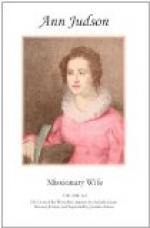“Yours, most respectfully,
“Sarah H. Boardman.”
“My dear Madam,
“I cannot do otherwise than honor and respect the sentiments conveyed in your letter, now received. You will, I hope, give me credit for sincerity, when I assure you, that in alluding to the system of instruction pursued by you, it has ever been a source of pride to me, to point out the quiet way, in which your scholars have been made acquainted with the Christian religion. My own Government in no way proscribes the teaching of Christianity. The observations in my official letter are intended to support what I have before brought to the notice of Government, that all are received, who present themselves for instruction at your schools, without any stipulation as to their becoming members of the Christian faith.
I cannot express to you how much your letter has distressed me. It has been a subject of consideration with me, for some months past, how I could best succeed in establishing a college here, the scholars of which were to have been instructed in the same system which you have so successfully pursued. Believe me,
“Yours very faithfully,
“A.D. Maingy
“Saturday.”
Appropriations were afterward made by the British government for schools throughout the Provinces “to be conducted on the plan of Mrs. Boardman’s schools at Tavoy;” and although the propagation of Christianity in the other schools was subsequently prohibited, yet in her own, she always taught as her conscience dictated.
It had been one of Mr. Boardman’s practices to make frequent tours among the Karen villages, to preach the gospel, and strengthen the disciples and the feeble churches. Even from this duty, as far as the visitation was concerned, his widow did not shrink, although she did shrink from writing or speaking much on the subject; doubtless always regarding it as a cross, which although she might bear with patience, she would willingly lay down as soon as duty should permit. Attended by her faithful Karens, and her little boy borne in their arms,—leaving Mr. Mason to his indispensable task of acquiring the language, she would thread the wild passes of the mountains, and the obscure paths of the jungle, fording the smaller streams and carried over the larger in a chair borne on bamboo poles by her followers,—carrying joy and gladness to the hearts of the simple-minded villagers, and cheering her own by witnessing their constancy and fidelity.
In her own inimitable style “Fanny Forrester” gives an account of an adventure of Mrs. Boardman during one of these excursions; in which the impression she made upon an English officer who encountered her far from civilized habitations, so unexpectedly that he almost mistook her for an angel visitant from a better sphere, was sufficiently pleasant to form the basis of a lasting friendship between them. Indeed




